Key takeaways:
- Breaking study sessions into smaller chunks (e.g., Pomodoro Technique) enhances focus and retention.
- Establishing a dedicated study routine and environment minimizes distractions and builds consistency.
- Incorporating active learning methods, like teaching concepts or using visual aids, deepens understanding.
- Setting achievable goals and rewarding milestones maintains motivation and engagement in study sessions.
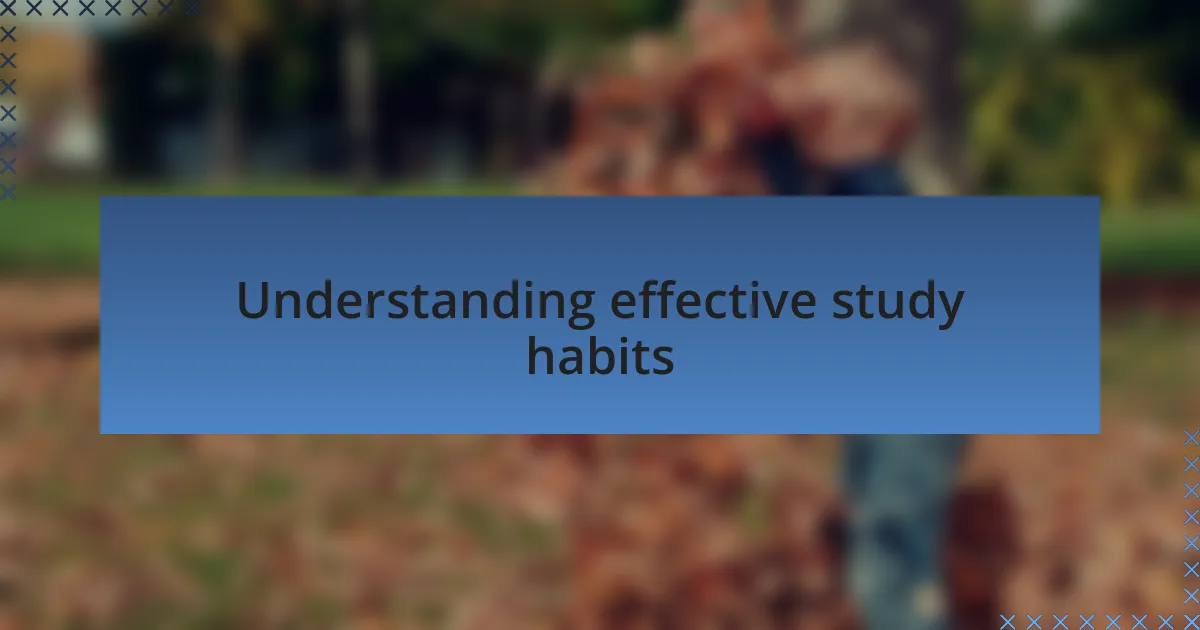
Understanding effective study habits
Effective study habits are critical for academic success, but what does that really mean? I remember struggling with my own approach to studying, often feeling overwhelmed by the material. It took me time to realize that understanding how I absorbed information was as important as the content itself.
For instance, I found that breaking my study sessions into smaller, manageable chunks not only kept me focused but also made the information feel less daunting. Have you ever noticed how a long, uninterrupted study session can drain your motivation? Shorter bursts of studying, like 25 minutes followed by a 5-minute break, helped me retain information better and stay engaged longer.
I also discovered the power of active learning—writing notes in my own words or teaching concepts to someone else. This process was like a light bulb moment for me. Isn’t it interesting how teaching what you’ve learned can deepen your understanding? Embracing these active strategies transformed my study routine and made each session something I looked forward to rather than something to dread.
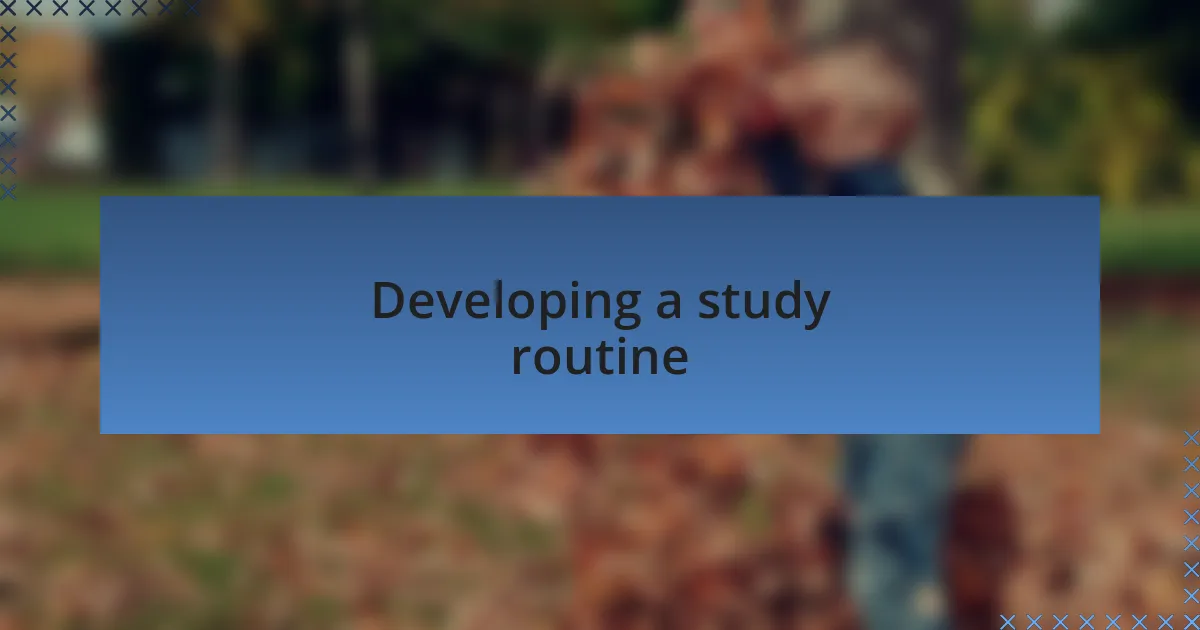
Developing a study routine
Establishing a study routine can feel like a daunting task, but I found that starting small made a huge difference. When I committed to studying consistently at the same time each day, it became a habit rather than a chore. Have you ever noticed how our brains love patterns? By creating a specific schedule, I not only improved my focus but also built a sense of security in my learning environment.
One key element of my study routine was setting clear, achievable goals for each session. I remember feeling lost without direction when I sat down to study, and it often led to frustration. Now, I use simple objectives, like completing a certain number of practice problems or summarizing a chapter. It feels incredibly rewarding to check these off, and it maintains my motivation throughout the week.
Additionally, I realized that a dedicated study space was essential for minimizing distractions. I once tried to study on my couch, but the cozy atmosphere only lured me into a nap! Finding a quiet spot with good lighting and limited interruptions made it much easier to dive into my work. Have you ever tried changing your environment to enhance your focus? Sometimes, the right setting can unlock your full potential.
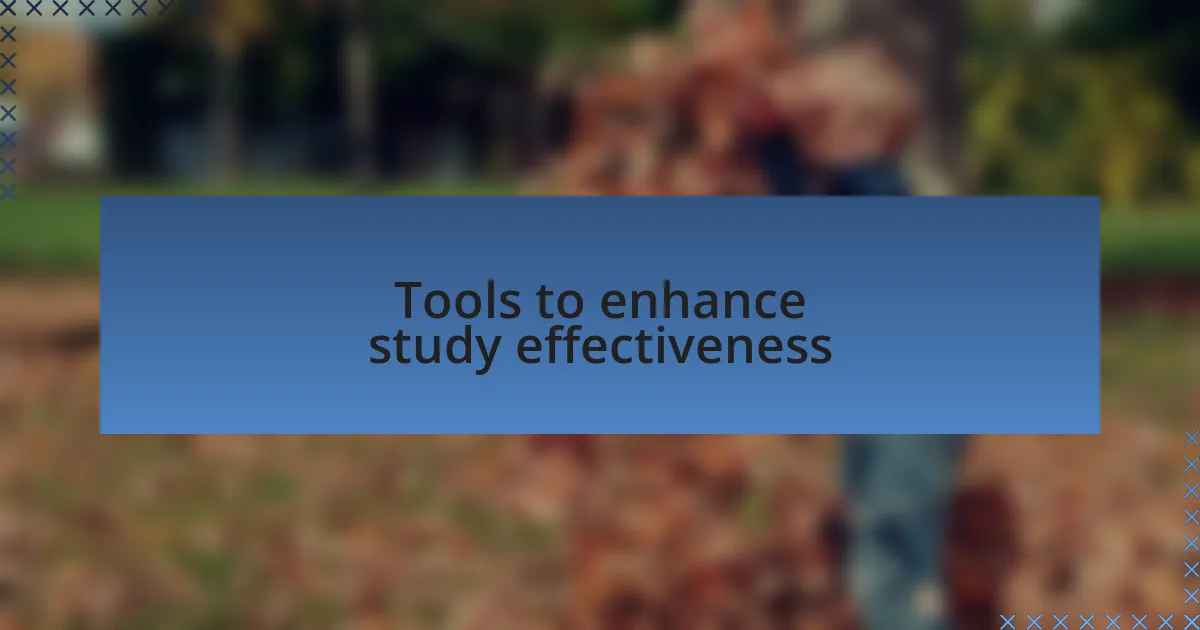
Tools to enhance study effectiveness
When it comes to tools that enhance study effectiveness, I cannot overstate the significance of digital apps. I vividly remember stumbling upon a time management app that allowed me to break my study periods into manageable chunks. By using the Pomodoro Technique—the idea of studying for 25 minutes and then taking a 5-minute break—I noticed a dramatic increase in my focus and retention. Have you ever tried structuring your study time this way? It feels almost like giving your brain a moment to breathe, making the entire process less overwhelming.
Another useful tool has been the practice of self-testing. I often create flashcards or quizzes to assess my understanding. I recall preparing for a particularly challenging exam; those flashcards transformed abstract concepts into bite-sized, memorable pieces of information. It’s invigorating to see your progress manifest in those little victories. Do you feel that satisfaction when you test your knowledge? I certainly do, and it pushes me to keep improving.
Lastly, I’ve found that using productivity trackers allows me to evaluate my study habits over time. In my experience, noting how long I spent studying each day and what I accomplished helped me identify patterns in my productivity. It’s empowering to see tangible evidence of my efforts and make informed adjustments. Have you ever analyzed your own habits in such a way? Gaining insight into my routine has helped me make meaningful changes, ultimately leading to greater success in my studies.
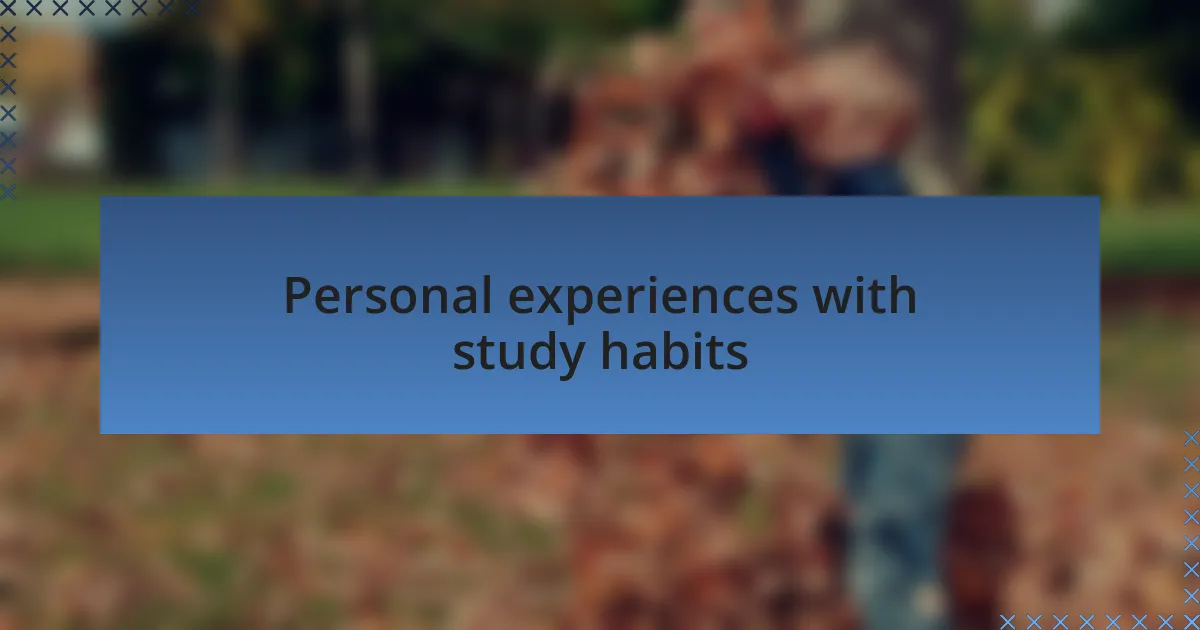
Personal experiences with study habits
I always found that my study habits were a reflection of my mindset. I remember a pivotal moment in high school when I decided to adopt a more structured approach; I created a visual study schedule that I hung up in my room. Not only did it serve as a daily reminder of my goals, but seeing my progress marked off felt incredibly rewarding. Have you ever experienced that rush of satisfaction when checking off completed tasks?
Another defining experience for me was learning the value of a quiet environment. I once attempted to study during a noisy family gathering, thinking I could focus despite the distractions. It was a disaster! I realized how crucial it is to carve out a comfortable, distraction-free space to truly absorb and retain information. Finding that perfect spot made all the difference and turned studying from a chore into a more enjoyable and productive activity.
Additionally, I discovered that incorporating creativity into my study sessions greatly enhanced my understanding. For example, I would sketch out complex ideas as mind maps. This not only engaged my artistic side but also transformed what seemed like dull information into visual stories. Have you found innovative ways to make your study sessions more engaging? Embracing creativity helped me connect with material on a deeper level, and I can’t stress enough how essential that has been in my educational journey.
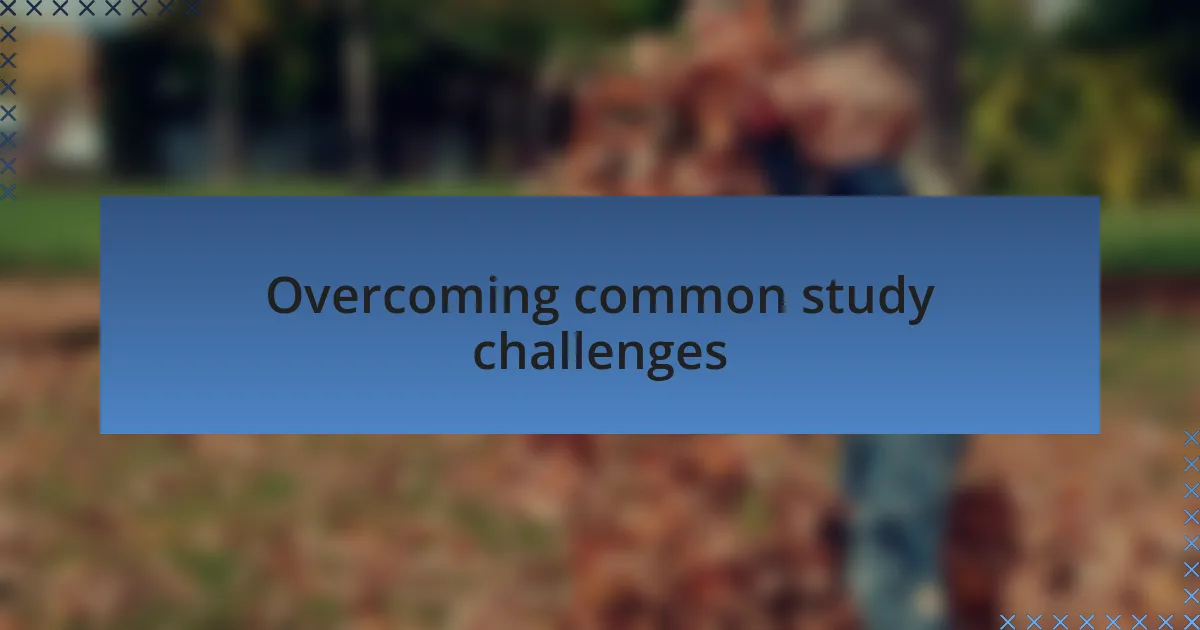
Overcoming common study challenges
One significant challenge I faced in my studying journey was procrastination. I would often tell myself, “I’ll start after just one more episode” of my favorite show. Eventually, I realized that breaking tasks into smaller, manageable pieces made a world of difference. Instead of tackling a whole chapter, I focused on just a few pages at a time, which helped me overcome that daunting feeling and actually start studying.
Another hurdle was managing my time effectively. There were days when it felt like I’d run out of time before I even began. I found that using a timer worked wonders for my focus. Setting a timer for 25 minutes of dedicated study, followed by a five-minute break, turned my studying into a game. Have you ever noticed how much more productive you can be when you can see the finish line, even if it’s just five minutes away?
Lastly, I struggled with motivation, especially on tough subjects. I learned that connecting what I was studying to my passions made it more interesting. For example, when learning about historical figures, I would think about how their decisions influenced my interests today. It’s incredible how such connections can ignite a spark of curiosity. What strategies have you used to find motivation when faced with challenging material?
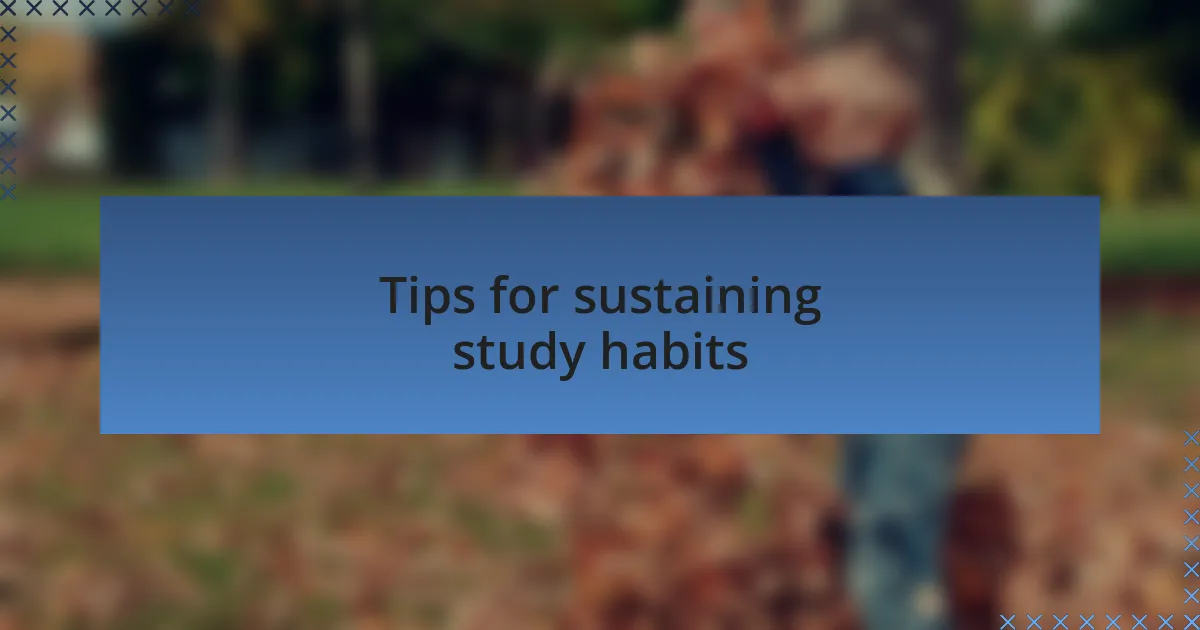
Tips for sustaining study habits
One crucial tip for sustaining study habits is to create a dedicated study environment. I vividly remember the days I tried to study in noisy or cluttered spaces. It disrupted my flow completely. Once I established a quiet, organized corner just for studying, everything changed. I found that having a specific spot made it easier to slip into the right mindset. What’s your study environment like?
Incorporating rewards for achieving study goals can also help maintain your motivation. I recall setting small milestones for myself, like finishing a chapter before treating myself to a favorite snack. Those little rewards made each session feel more worthwhile. Have you considered blending fun with your study schedule to make it feel less like a chore? This strategy can enhance your enthusiasm and commitment in the long run.
Lastly, staying connected with peers who are equally committed can have a powerful impact. I used to form study groups with friends who shared similar goals, and the camaraderie was uplifting. We would encourage each other, sharing tips and insights. Have you thought about how a support network can bolster your study habits? Engaging with others not only brings accountability but also enriches your learning experience.